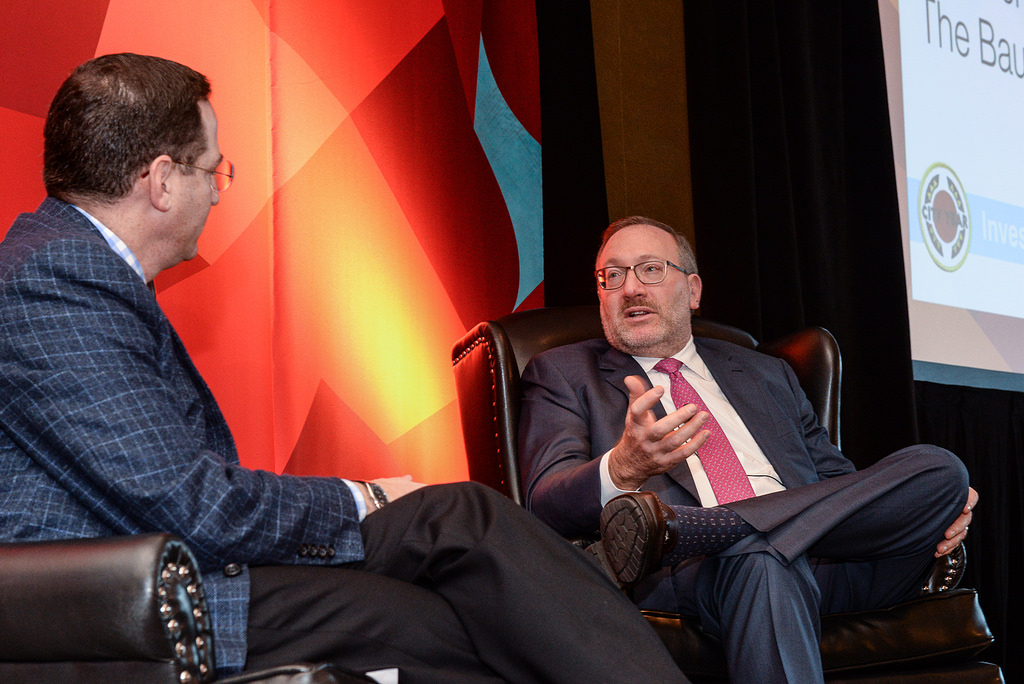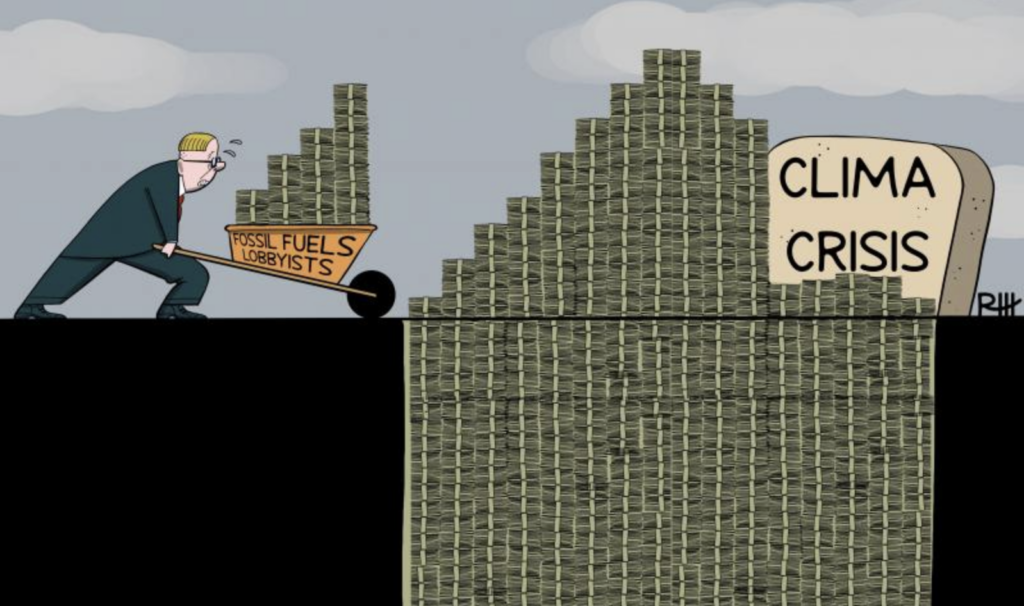By Rob Galbraith, crossposted from LittleSis.org’s Eyes on the Ties
The island of Puerto Rico has been devastated by a set of human-made catastrophes – two hurricanes supercharged by fossil fuel emissions and a debt crisis and ruthless austerity regime imposed by Wall Street.
Seeds for both of these disasters were sown by Seth Klarman, the president of Baupost Group, a Boston-based hedge fund heavily invested in both Puerto Rican debt and in the oil and gas industry. Klarman is also a trustee of the American Enterprise Institute, a think tank which has both fought against action on climate change and for austerity in Puerto Rico.
Baupost Group went to great lengths to conceal its ownership of bonds backed by Puerto Rican sales tax revenues by investing in the debt through a series of subsidiaries named Decagon Holdings. Baupost’s investment was eventually exposed by The Intercept’s David Dayen in collaboration with PAI/LittleSis. In the most recent court filing, Baupost shell companies reported owning more than $925 million in COFINA bonds backed by sales tax revenues.
Baupost also holds $1.8 billion of equity in oil and gas companies. At the end of the second quarter of 2017, oil and gas stocks made up 21% of Baupost’s equity portfolio, including more than $1 billion worth of stock in liquefied natural gas exporter Cheniere Energy. Other oil and gas equities held by Baupost include Antero Resources – $457.5 million – and PBF Energy – $350 million.
Among the top 10 owners of Puerto Rican debt identified by Centro de Periodismo Investigativo (CPI), three others – Monarch Alternative Capital, Goldentree Asset Management, and Oaktree Capital Management – also have significant public fossil fuel holdings.
See map at LittleSis.org.
Cheniere Energy and Baupost
Baupost Group is the second-largest shareholder in liquefied natural gas (LNG) export firm Cheniere Energy. According to SEC filings, Baupost owns 8.7% of all outstanding Cheniere stock, second only to legendary corporate raider Carl Icahn.
Cheniere was the first company to receive permits to export LNG from the lower 48 United States. The company was the first to apply for export permits in 2013, from its Sabine Pass gas terminal. Exporting natural gas was not feasible before then (in fact, Cheniere’s facility was built as an LNG import terminal amid fears in 2008 of a natural gas shortage); however, the glut of cheap methane made available by the fracking boom changed the calculus. Since Cheniere first applied to export LNG, several other companies have followed suit, seeking and receiving export permits from the federal government, though none have yet made any shipments.
Though President Obama embraced a broad expansion of LNG exports as a way to address the climate crisis, in 2014 the Department of Energy found that using LNG for power production in Europe and Asia offered no climate benefit over coal.
Much of the political support for LNG exports came thanks to an enormously influential 2011 report from the Massachusetts Institute of Technology called “The Future of Natural Gas.” The report was funded by a number of industry sponsors and touted natural gas produced by fracking as a climate benefit and specifically called for the expansion of liquefied natural gas exports. John Deutch, a former CIA director who sat on the board that advised the study, was also a board member at Cheniere at the time.
PAI detailed the ties behind this study that drove political support for LNG exports in our 2013 report “Industry Partner or Industry Puppet?”
Cheniere gained necessary approvals to export LNG in 2013 and in 2014, President Obama’s top energy advisor Heather Zichal took a seat on the Cheniere board of directors.
Between 2014 and the end of 2016, Klarman accrued a stake in Cheniere that was worth more than $1.2 billion and accounted for 11.8% of the company’s total outstanding shares at its peak. Though he has since sold off some of his Cheniere stock, Baupost Group is still the second-largest beneficial owner of the company with 8.7% of outstanding shares.
Other energy companies
Baupost also owns a $457.5 million stake in Antero Resources, an oil and gas fracking venture focused on drilling in Appalachia. According to an August 2017 filing with the SEC, Baupost owns 21.2 million shares of Antero stock, equal to 6.7% of the company’s total outstanding shares.
Oddly, neither Baupost nor Klarman is listed among major beneficial owners on Antero’s 2017 proxy form (filed in April 2017), though they do appear on the company’s 2016 proxy.
Klarman’s fund further owns a 14% stake worth $350 million in PBF Energy, an oil and gas refining company. On PBF’s 2017 proxy statement to the SEC, Baupost is identified as the company’s largest beneficial shareholder.
Between Cheniere, Antero, and PBF Energy, Baupost has more than $1.8 billion invested in publicly traded oil and gas companies, playing a major role in financing the drivers of climate change – which has wrought cataclysm on places like Puerto Rico.
Baupost and Puerto Rico
Klarman’s investments in Puerto Rico were not always public knowledge. Court documents from a lawsuit filed by investors in COFINA bonds show a set of ten shell companies – named Decagon Holdings 1 through 10, LLC – collectively own more than $925 million of the bonds.
Those shell companies were created in August 2015, presumably for the purpose of investing in distressed Puerto Rican bonds. The debt was an attractive investment to many “vulture funds” that bought up bonds at a sharp discount due to the island’s precarious financial situation. They then pressured the Puerto Rican government to pay them off at full price, in the hopes of generating massive profits for investors while forcing cuts to infrastructure investments and social services for the people of Puerto Rico.
These cuts contributed to the hurricanes’ catastrophic impact on the island.
Klarman, who is notoriously secretive, says that Baupost used the Decagon Holdings entities to keep competitors from learning about the debt purchases, which he told CNBC “could have an adverse effect on our ability to trade.” None of the other major bondholders concealed their investments via shell companies.
It is also plausible that Klarman was also trying to protect himself from negative publicity. His undisclosed multi-million-dollar contribution to a pro-charter school PAC in Boston made waves earlier this year.
American Enterprise Institute
Klarman is also a trustee at the American Enterprise Institute, a free market think tank that has long trafficked in climate change denial and has touted austerity while pushing policies favorable to its corporate donors. Klarman’s fellow trustees include several executives at hedge funds and private equity firms as well as executives from major US corporations such as Dell and State Farm.
AEI was a vocal supporter of increasing exports of liquefied natural gas as well as lifting the ban on crude oil exports, both of which were enacted late in President Obama’s second term. The group receives hundreds of thousands of dollars per year from ExxonMobil and has also obtained funding from the family charity of Charles Koch. It has also received millions through DonorsTrust and Donors Capital Fund, the so-called “dark money ATMs” that allow wealthy donors to conceal their funding of various right-wing causes.
The think tank, whose board of trustees includes 14 hedge fund and private equity executives, has also taken a hard line on Puerto Rico. On June 30, 2017, AEI published an article by four members of the Puerto Rico Financial Oversight and Management Board appointed by President Obama calling to privatize PREPA, the Puerto Rican power authority, to protect bondholders and encourage more private investment on the island. A July 20 column called for cutting Puerto Rico’s minimum wage, “reforming” welfare payments, and “streamlining” labor laws to cut employment costs.
On October 17, as millions on the island were without power or water and – as we now know – hundreds of people were dying in the wake of Hurricanes Irma and Maria, AEI’s Benjamin Zycher wrote that asking Puerto Rico’s creditors to take a haircut on their debt would be “perverse.”
Other Puerto Rico vultures have major fossil fuel investments
Baupost Group is not the only hedge fund that is heavily invested in both Puerto Rican debt and in the fossil fuel-induced climate change superpowering Atlantic storms. Three other firms among the top 10 holders of the island’s debt, as identified by CPI in In These Times, have significant public fossil fuel holdings.
Goldentree Asset Management
When CPI published its analysis on October 17, 2017, Goldentree Asset Management, led by Steve Shapiro, was the fifth largest known holder of Puerto Rican debt, with $587 million worth of COFINA bonds. However, an October 26 filing shows that Goldentree has increased its stake and now owns $852 million worth of COFINA bonds.
Shapiro’s firm also owns $47.8 million in equity in fossil fuel companies, 10.35% of its total public holdings.
Appalachian shale driller Rice Energy is the biggest fossil fuel stock in Goldentree’s public portfolio; the fund’s $22.5 million stake makes up 4.86% of its holdings. Goldentree also has money invested in Parsley Energy and Southwestern Energy Corp.
Monarch Alternative Capital
Monarch Alternative Capital, founded by Michael Weinstock, Andrew Herenstein and Chris Santana, owns $607 million worth of general obligation bonds. The firm is part of an ad hoc coalition of bondholders which has tried to force Puerto Rico to fire teachers, cut public funding for the University of Puerto Rico, and cut Medicaid benefits as part of a repayment plan.
Monarch is also a major investor in coal. The firm owns $226 million worth of stock in Arch Coal, 13.2% of the company according to a March 2017 SEC filing. Arch stock makes up 20.3% of Monarch’s total public portfolio.
The firm also owns $40.6 million worth of stock in Resolute Energy Corp, an oil and gas company headquartered in Denver whose major fracking operations are in the Delaware Basin in West Texas and New Mexico.
Oaktree Capital Management
Oaktree Capital Management is the ninth largest owner of Puerto Rican debt. The fund, co-chaired by Howard Marks and Bruce Karsh, holds $410 million in Employee Retirement System bonds.
The firm also has $1.29 billion invested in fossil fuels, including $845 million in Vistra Energy, a Texas electric utility that uses coal and nuclear power.
Other major fossil fuel holdings in Oaktree’s public portfolio include a $73.5 million stake in Andeavor, the petroleum refining operation formerly known as Tesoro; a $72.6 million stake in Energy XXI, an offshore drilling company in the Gulf of Mexico; and a $42.9 million stake in Comstock Resources, a Texas exploration and production company.
Puerto Rico’s debt crisis and climate crisis connected
In sum, many of the same powerful hedge funds that are driving the austerity crisis in Puerto Rico are also helping to fuel the climate change that we see devastating the island now.
The humanitarian disaster, whose official death toll of 55 reflects an issue of serious underreporting, has its origins in the public service cutbacks demanded by the creditors that bought up Puerto Rico’s debt and in the global warming caused by the production and exploitation of fossil energy.
Nowhere do the human causes of these disasters converge more clearly than in the case of Seth Klarman, whose billions of dollars in investments in Puerto Rican debt and fossil energy companies and board seat at a think tank pushing austerity and climate change denial situate him at the center of Puerto Rico’s crisis.
Image credit: Seth Klarman 2014 City Year Boston Investment Community Breakfast. Photo by Jennifer Cogswell
Subscribe to our newsletter
Stay up to date with DeSmog news and alerts







